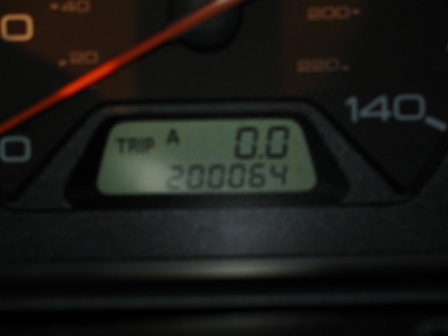Today we got our ride, a 2000 Honda Odyssey, past 200,000 miles.
Here’s to, hopefully, at least 50,000 more. She’s been a good car.


Today we got our ride, a 2000 Honda Odyssey, past 200,000 miles.
Here’s to, hopefully, at least 50,000 more. She’s been a good car.

Pray then like this:
“Our Father in heaven,
hallowed be your name.Your kingdom come,
your will be done,
on earth as it is in heaven.”– Matthew 6:9-10
Sometimes basic things that you’d think I would have internalized by now reach up and grab me. In this case, the first few lines of the Lord’s prayer are singing to me right now, inspired by a lunch conversation with Brian in Spring.
The Lord’s prayer is, plainly, a pattern to be followed rather than a formula to be uttered. “Pray then like this”. So what is this pattern?
I’ve long seen the beauty and appropriateness of calling out to my Father and hallowing his name as a start to prayer. But what I’ve missed, and this is crucial, is that prayer becomes beggared if my next step is to launch into a list of my needs. When I do that, I set the wrong stage. I’m reading from the wrong script, and I’m sitting in the director’s chair when I should really be in the background, if not out of the building entirely.
The first thing to pray for is God’s kingdom to come; for his rule and ways to be established and to flourish here on earth, just as in heaven. Hand in glove to this is to pray for his will to be done. Praying for God’s will is good, vigorous exercise for our souls, because, if you’re like me, you know that desiring God’s will is difficult. It cuts against the grain of my selfishness. And that’s why prayer for his kingdom and his will needs to be the framework within which my prayer lives and moves and has its being. It will make for more difficult prayer. Sometimes the most difficult prayer we can imagine. But it’s the best prayer, and puts into perspective my petty wants.
This is basic stuff. And I find that I’m a remedial believer for not having made it the stuff of my life before this day. Here’s hoping (and praying) that my prayers will more closely match the pattern going forward.
It’s probably not, but if it is . . . [Chris Farley voice here] . . . it’s TOTALLY AWESOME!
[H/T the Corner]
This weekend we celebrated Bethany’s sixteenth birthday!
Molly took some pictures. I love these.


Note Bethany’s new Dean Exotica acoustic guitar.

Lots more here.
I’m pretty tired. For a lot of good reasons; and I mean “good” in the literal sense. There are some very cool things going on, family-wise.
Not being a natural writer, I find myself struggling for words. Bottom line, though, I think it’s time I take another break from the wider blogosphere. I have a love-hate-love relationship with the thing: I write blog software, for crying out loud, so I’m an enabler for the hundreds dozen or so people who actually make use of my wares. I’ve been writing posts here and elsewhere for six years. And I read a lot of blogs. And therein lies the problem, I think . . . I’m worn out. I’m becoming a “Yes, but . . .” type of person when reading opinion. Some blogs I read eat at me. I feel out of sync, out of touch, and the law of diminishing returns is kicking in.
So, my plan is to take a break from most of the other blogs I read, for awhile. Sometime tonight I’m going to take another sweep through my blogroll and cull most of it. I’m going to try and just concentrate on what’s going on around here, and perhaps write a bit more, here. I’ve got lots to say, but, again, the catch is taking the time to say them, in writing.
Off to work!
P.S. For your listening pleasure, Andrew and Molly singing Grace upon Grace.
Maybe you’re having trouble with forgiveness because you’ve been badly burned by someone. Someone has abused you, offended you, cheated on you, or wronged you in some way. Maybe there’s a huge chasm between you and someone you love (or want to love). You understand intellectually that you ought to forgive, but the idea is so painful because of what this person has done to you. Your spirit is willing but your flesh is weak. You may have thought at some point while reading this chapter, That’s easy for you to say. You don’t know what I’ve been through.
You’re right; I probably don’t know what you’ve been through. But that emotion you’re feeling right now, that weight, that discomfort you feel when you ponder the gravity of forgiving such huge wrongs against you, is a taste of the scandal of grace.
I’m not sure I can even express this strongly enough: grace is scandalous. It’s unbelievable. It’s weird. It’s nonsensical. It disturbs us and confuses us. It burns.
But it heals.
Jared C. Wilson, Your Jesus is Too Safe, Chapter 3: Jesus the Forgiver
I cannot even explain how geeked out I am over this!
The historic Apollo 11 mission launched on this day forty years ago. You can follow the mission in real time (minus exactly forty years). They are orbiting the earth right now. Trans-lunar injection in about 89 minutes.
I’ve got the audio on so I can listen to the back and forth between Mission Control and the crew.
Amazing.
Let’s be frank: if you find the message of Jesus easy to digest, you’d better check the label on the box. You may be consuming a diluted version of Christianity. The message of Jesus – that he himself is life and you can’t get it anywhere else, least of all in yourself – is the hardest message we could ever hear, because it goes completely against our perceptions and conceptions, our prejudices and our opinions. It goes radically against the bent of our souls.
– Jared Wilson, Your Jesus is Too Safe, Chapter 1.
This is the day that the Lord has made;
let us rejoice and be glad in it.– Psalm 118:24
I appeal to you therefore, brothers, by the mercies of God, to present your bodies as a living sacrifice, holy and acceptable to God, which is your spiritual worship.
– Romans 12:1 (ESV)
Romans 12:1 follows Romans chapters 1 through 11, in which Paul has systematically expounded on God’s great mercies toward us. Paul’s audience, which included converted Roman pagans, no doubt caught his stunning reversal of the concept of sacrifice when compared to the millennia-long practice of sacrifice that they knew well.
For a pagan (and, sadly, for many of us that call ourselves Christians), sacrifice is something we do to gain the favor of the gods. Love and mercy are foreign concepts to normal modes of sacrifice. Sacrifice to a pagan is a transaction, a trade. And sacrifice usually involves blood and death.
But by the mercies of God, this is not the sacrifice that we are called to. Rather than spill blood in order to satiate and gain favor from the gods, we have had the Lord’s favor bestowed on us through his grace alone. Dwell on his mercy, gain a small understanding of his overwhelming love, and we find ourselves bowed before him in worship, awed by his great gifts to us.
And it is in this desire to worship, which goes so far beyond (and often has nothing to do with) singing to him, that Paul urges us to the beautiful righting of an upside down pagan vision: not a dead sacrifice caked with blood and flames, but rather a living sacrifice. joyfully and freely given to the Lord who has no need for anything, and who indeed has already given his all to us.
It’s the moment by moment sacrifice of a life fully yielded; a beautiful work of art offered to the master Craftsman who made it.
Holy and acceptable.
That’s worship.
Update: here’s eldest son’s take on this verse.